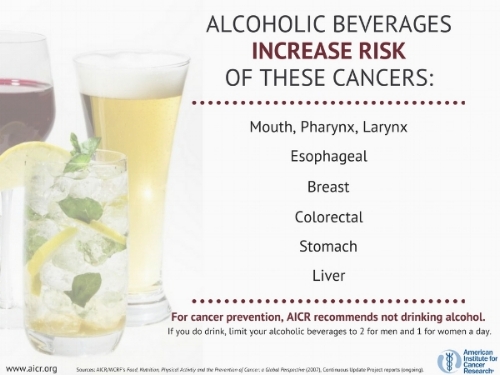March is Colorectal Cancer Awareness Month
Did you know? In the US, colorectal cancer is the third most common cancer (behind breast cancer for women, prostate cancer for men and lung cancer for both sexes). It is also the third deadliest cancer in the US. The good news? According to the American Institute for Cancer Research (AICR), nearly half of colorectal cancer cased could be prevented by making small changes in what we eat and how much we move.
What Increases Risk of Colorectal Cancer?
Alcohol: Our body converts alcohol to acetylaldehyde which is a potential carcinogen. Alcohol can also act as a solvent, allowing carcinogens to enter the cells lining the colon.
Recommendation: Limit alcohol intake to one drink per day for women or two drinks per day for men (if you choose to drink).
Excess Body Fat: Being overweight or obese increased levels of insulin and related hormones in the blood that can encourage the growth of colorectal cancer, just as it does some other cancer. Excess fat also creates an inflammatory state which can contribute to cancer growth.
Calculate your Body Mass Index (BMI) - BMI Indicator
Red Meat: Heme iron, present in red meat, has been linked to cellular damage that can increase colorectal cancer risk. Red meat also stimulates the production of carcinogenic substances, N-nitroso compounds, in the body. The cooking method used may also increase risk. Meat cooked at very high temperatures produces heterocyclic amines (HCAs) and polycyclic aromatic hydrocarbons (PAHs), which are carcinogens.
Recommendation: Keep red meat intake to less than 18 ounces per week. You don't have to eliminate red meat all together - choose smaller portions and try having some meat-free days. Beans such as pinto, kidney, black and garbanzos are a great high fiber, high protein, low fat substitute for meat.
Processed Meat: Substances added in processing such as nitrites and nitrates contribute to the production of carcinogens that may damage the gut lining. Examples of processed meat include deli meats, bacon, ham and hot dogs.
What Decreases Risk of Colorectal Cancer?
Physical Activity: Being physically active decreases inflammation and can help regulate hormone levels. Exercise can also help control body weight.
Recommendation: Being physically active for at least 30 minutes a day. Choose an activity you enjoy - walking, running, cycling, even dancing!
Source: American Institute for Cancer Research
Fiber: Fiber adds bulk to your diet and shortens the amount of time wastes (carcinogens) travel through the colon, decreasing the exposure to carcinogens. High fiber diets may also reduce insulin resistance. Check out the Three Day High Fiber Diet Menu. Foods high in fiber include whole fruits and vegetables, whole grains such and beans.
Whole Grains: Whole grains contain all parts of a grain including the bran and germ which are often removed in the refining process. These parts contain antioxidants and phytochemicals that have anticancer properties. For more info on whole grains check out Have You Had Any Whole Grains Today?
Recommendation: Three servings of whole grains per day (for a total of 90 grams/day). A serving is equal to about 1/2 cup of cooked whole grain pasta, rice, cereal or 1 slice whole grain bread.
Some recipes to try for a Cancer Preventive Diet: Chunky Monkey Overnight Oats, Brussels Sprout Salad with Maple Dijon Vinaigrette, Mexican Barley Stuffed Peppers, Summertime Chili, Cannoli Cream with Strawberries and Pistachios and, one of my all-time favorites - Strawberries and Yogurt Bars.





